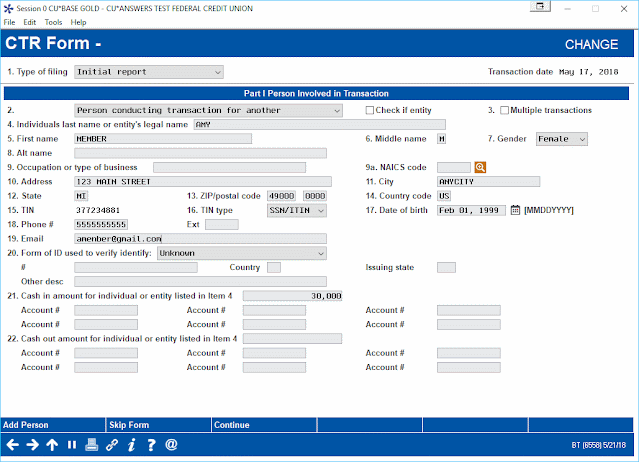CTR filing, also known as Currency Transaction Report filing, is a process where financial institutions report to the Financial Crimes Enfor...
CTR filing, also known as Currency Transaction Report filing, is a process where financial institutions report to the Financial Crimes Enforcement Network (FinCEN) when a cash transaction exceeds $10,000 in a single business day.
When filing a CTR, the financial institution must provide the following information:
1. The name and address of the account holder who conducted the transaction
2. The account number of the account holder who conducted the transaction
3. The type of transaction (e.g. deposit, withdrawal, exchange, etc.)
4. The date and time of the transaction
5. The amount of currency involved in the transaction
6. The type of currency involved in the transaction
7. The name and address of the individual or business that received the currency (if applicable)
8. Any additional information required by FinCEN
Filing a CTR is required under the Bank Secrecy Act (BSA) of 1970. Failure to file a CTR can result in significant penalties for financial institutions, including fines and even criminal charges.
In summary, a CTR filing is a report that financial institutions are required to file with FinCEN whenever a cash transaction exceeds $10,000 in a single business day. The report is designed to prevent money laundering and other financial crimes.
The purpose of CTR filing is to help prevent money laundering and other financial crimes by creating a record of large cash transactions that could be used to finance criminal activities. CTRs are filed by banks, credit unions, and other financial institutions that are subject to the Bank Secrecy Act (BSA) regulations.
When a customer conducts a cash transaction exceeding $10,000 in a single business day, the financial institution is required to file a CTR with FinCEN within 15 days of the transaction. The CTR must include information about the customer, the transaction, and any other relevant details required by FinCEN.
The information provided in a CTR is used by law enforcement agencies to track the movement of large sums of cash and to identify potential criminal activity. Financial institutions are required by law to maintain strict confidentiality of the information contained in the CTR and are prohibited from disclosing the information to anyone except as authorized by law.
In summary, CTR filing is a regulatory requirement designed to help prevent financial crimes such as money laundering. Financial institutions are required to file a report with FinCEN when a customer conducts a cash transaction exceeding $10,000 in a single business day. The information provided in the CTR is confidential and is used by law enforcement agencies to track the movement of large sums of cash and identify potential criminal activity.



No comments